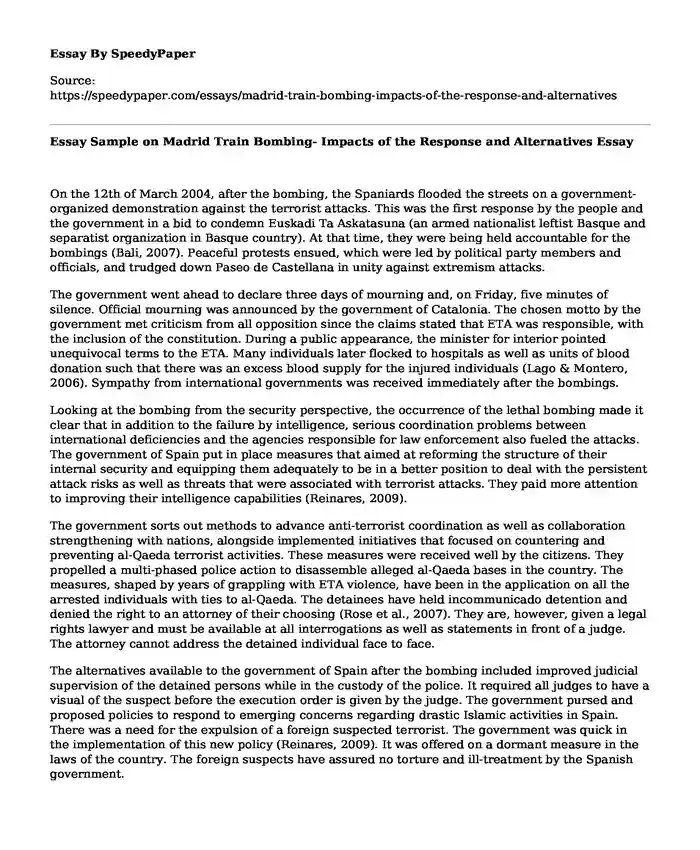
| Type of paper: | Essay |
| Categories: | Analysis Terrorism Government Disaster |
| Pages: | 3 |
| Wordcount: | 669 words |
On the 12th of March 2004, after the bombing, the Spaniards flooded the streets on a government-organized demonstration against the terrorist attacks. This was the first response by the people and the government in a bid to condemn Euskadi Ta Askatasuna (an armed nationalist leftist Basque and separatist organization in Basque country). At that time, they were being held accountable for the bombings (Bali, 2007). Peaceful protests ensued, which were led by political party members and officials, and trudged down Paseo de Castellana in unity against extremism attacks.
The government went ahead to declare three days of mourning and, on Friday, five minutes of silence. Official mourning was announced by the government of Catalonia. The chosen motto by the government met criticism from all opposition since the claims stated that ETA was responsible, with the inclusion of the constitution. During a public appearance, the minister for interior pointed unequivocal terms to the ETA. Many individuals later flocked to hospitals as well as units of blood donation such that there was an excess blood supply for the injured individuals (Lago & Montero, 2006). Sympathy from international governments was received immediately after the bombings.
Looking at the bombing from the security perspective, the occurrence of the lethal bombing made it clear that in addition to the failure by intelligence, serious coordination problems between international deficiencies and the agencies responsible for law enforcement also fueled the attacks. The government of Spain put in place measures that aimed at reforming the structure of their internal security and equipping them adequately to be in a better position to deal with the persistent attack risks as well as threats that were associated with terrorist attacks. They paid more attention to improving their intelligence capabilities (Reinares, 2009).
The government sorts out methods to advance anti-terrorist coordination as well as collaboration strengthening with nations, alongside implemented initiatives that focused on countering and preventing al-Qaeda terrorist activities. These measures were received well by the citizens. They propelled a multi-phased police action to disassemble alleged al-Qaeda bases in the country. The measures, shaped by years of grappling with ETA violence, have been in the application on all the arrested individuals with ties to al-Qaeda. The detainees have held incommunicado detention and denied the right to an attorney of their choosing (Rose et al., 2007). They are, however, given a legal rights lawyer and must be available at all interrogations as well as statements in front of a judge. The attorney cannot address the detained individual face to face.
The alternatives available to the government of Spain after the bombing included improved judicial supervision of the detained persons while in the custody of the police. It required all judges to have a visual of the suspect before the execution order is given by the judge. The government pursed and proposed policies to respond to emerging concerns regarding drastic Islamic activities in Spain. There was a need for the expulsion of a foreign suspected terrorist. The government was quick in the implementation of this new policy (Reinares, 2009). It was offered on a dormant measure in the laws of the country. The foreign suspects have assured no torture and ill-treatment by the Spanish government.
The new anti-terrorism measures are in accordance with human rights. Illegal torturing and ill-treatment would be eradicated completely. Solitary confinement is contemplated as punishment for serious terrorist attacks. When they are in confinement, the inmates are allowed to have at least two hours in the yards of the prison they are in (Art. 254).
References
Bali, V. A. (2007). Terror and elections: Lessons from Spain. Electoral Studies, 26(3), 669-687.
Lago, I., & Montero, J. R. (2006). The 2004 election in Spain: Terrorism, accountability, and voting. ICPS, Institut de ciències politiques i socials.
Reinares, F. (2009). After the Madrid bombings: Internal security reforms and prevention of global terrorism in Spain. Studies in Conflict & Terrorism, 32(5), 367-388.
Rose, W., Murphy, R., & Abrahms, M. (2007). Does terrorism ever work? The 2004 Madrid train bombings. International Security, 32(1), 185-192.
Cite this page
Essay Sample on Madrid Train Bombing- Impacts of the Response and Alternatives. (2023, Aug 09). Retrieved from https://speedypaper.net/essays/madrid-train-bombing-impacts-of-the-response-and-alternatives
Request Removal
If you are the original author of this essay and no longer wish to have it published on the SpeedyPaper website, please click below to request its removal:
- The Guilt of the Whites' Atrocities over the Natives - Free Essay on the Avatar Movie
- Krudas Cubensi - Free Essay Containing Songs Analysis
- Ensuring Social Justice and Cultural Competency for Undocumented Immigrants: Essay Sample
- Paper Example: International Human Rights and Missing Indigenous People in Canada
- What Is Katz's Main Argument Regarding Porn and What It Does? Free Essay
- Walmart: America's Favorite Shopping Destination - Paper Sample
- Essay Sample on Early Modern Ireland
Popular categories




